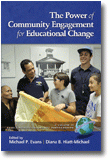
The Power of Community Engagement for Educational Change
Edited by:
Michael P. Evans, Miami University
Diana Hiatt-Michael, Pepperdine University
A volume in the series: Family School Community Partnership Issues. Editor(s): Diana Hiatt-Michael, Pepperdine University.
Published 2015
Effective schools engage a wide range of families and community members to support their award‐winning programs. This monograph highlights exemplary examples of communities, including foundations, community organizers, non‐profit organizations, community agencies, as well as school districts, that lead successful group, school, district and state level initiatives to improve educational outcomes.
Practitioners and scholars join hands to share promising practices and research‐based examples of community initiatives that have had positive impacts on families, schools, and communities. This monograph is vital to educational leadership preparation programs; education policymakers at the local, state, and national levels; school and district level administrators; and a broad range of community leaders.
CONTENTS
Foreword, Diana B. Hiatt‐Michael. The Power and Potential of Community‐Based Approaches to Educational Change, Michael P. Evans. Two Concepts of Community Engagement: Interviews with Don Davies and Martin Blank, Diana B. Hiatt‐Michael. From Private Citizens to Public Actors: The Development of Parent Leaders Through Community Organizing, Mark R. Warren, Karen L. Mapp and Paul J. Kuttner. Community Engagement as a Central Activity in New Charter Schools, Brian R. Beabout and Joseph L. Boselovic. Parents and School Fundraising Policies: From Donors To Equity Advocates, Sue Winton. Youth Engagement in Educational Change, Cristen Jenkins. Promising Practices for Principals: Partnering With Youth Organizers Inside Schools, Jerusha Conner. Operation Dream: The Formation of an Out‐of‐School Time Program for Youth, Martin Scanlan. Foundation Support for Bridge‐building Between District Personnel and Local Communities, Mara Casey Tieken, Tracie Potochnik and Keith C. Catone. Community Organizing for Highly Effective Teachers: Grow Your Own, Anne Hallett and Michael D. Rodríguez. Important Qualities In A School Community Partnership: Focus On Refugee And Immigrant Families, Sergio Keck, Shirin Timms, and Guofang Li.
REVIEWS
"In conclusion, The Power of Community Engagement for Educational Change provides readers with an overview of the field (past, present, and future) and numerous accounts of community-based initiatives. These highly detailed accounts—which offer insights into the goals, frameworks, outcomes, and processes associated with authentic community engagement—were carefully selected to ensure maximum variety with regard to location, setting, demographics, and other characteristics. As a result of these features, the book is most suitable for practitioners and educators who wish to assume an active role in the advancement of community engagement. Nonetheless, as the book covers such a wide array of initiatives, it may also be incorporated into teacher education courses and utilized for purposes not explicitly identified by editors.7/1/2019" Tracey Kumar Southeastern Louisiana University in School Community Journal
-
Paperback9781681231884
Web price: $45.04 (Reg. 52.99)
-
Hardcover9781681231891
Web price: $80.74 (Reg. 94.99)
- eBook9781681231907

- EDU000000 - EDUCATION: General
- FAM016000 - FAMILY & RELATIONSHIPS: Education
- FAM002000 - FAMILY & RELATIONSHIPS: Activities
-
 Composing Storylines of Possibilities
Immigrant and Refugee Families Navigating School
Composing Storylines of Possibilities
Immigrant and Refugee Families Navigating School
-
 Critical Perspectives on Education Policy and Schools, Families, and Communities
Critical Perspectives on Education Policy and Schools, Families, and Communities
-
 Family and Community Partnerships
Promising Practices for Teachers and Teacher Educators
Family and Community Partnerships
Promising Practices for Teachers and Teacher Educators
-
 Family Involvement in Faith-Based Schools
Family Involvement in Faith-Based Schools
-
 Promising Practices for Engaging Families in Literacy
Promising Practices for Engaging Families in Literacy
-
 Promising Practices for Engaging Families in STEM Learning
Promising Practices for Engaging Families in STEM Learning
-
 Promising Practices To Empower Culturally And Linguistically Diverse Families Of Children With Disabilities
Promising Practices To Empower Culturally And Linguistically Diverse Families Of Children With Disabilities

